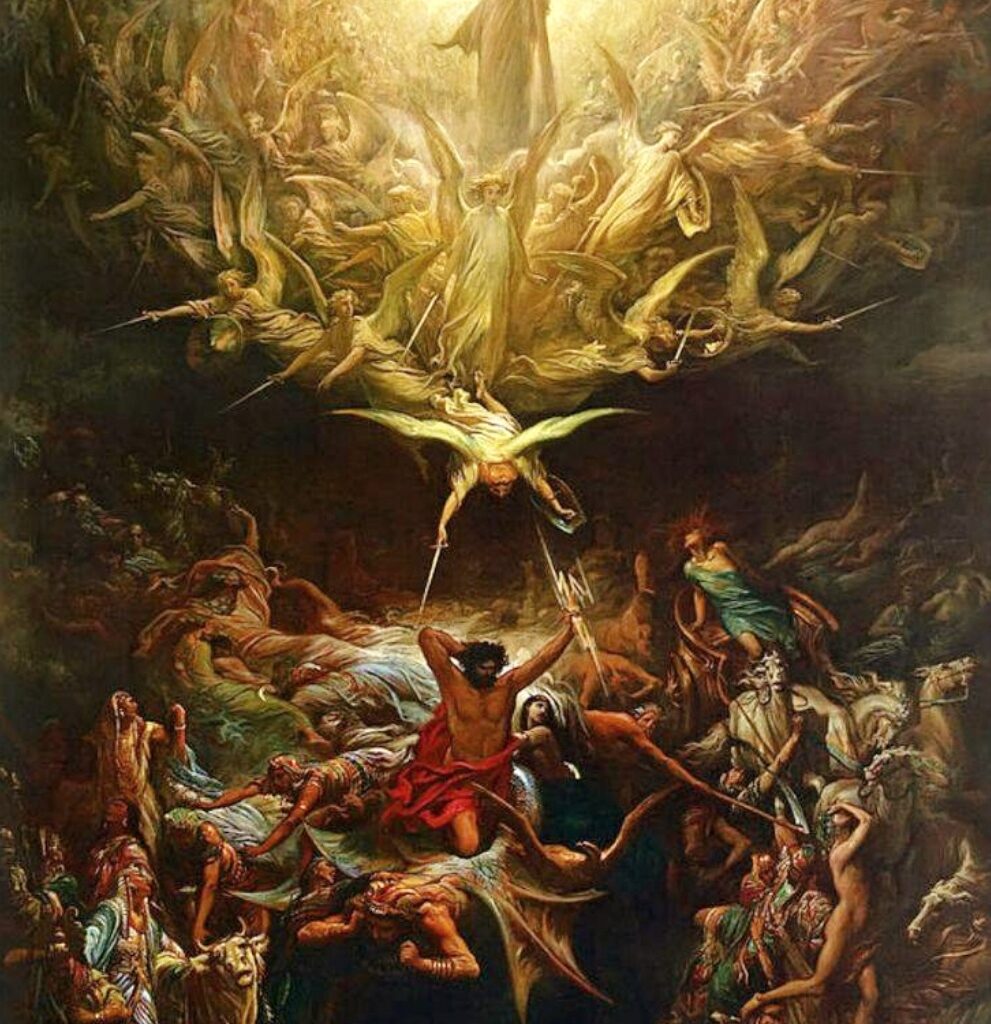In a moment that reverberates through history and eternity, Jesus, standing before His accusers, experiences an act of violence that challenges the very foundations of power and authority as we understand them. An officer strikes Him—the Creator of the Universe: God Almighty—in the face. This incident, seemingly simple in its brutality, opens a window into the profound depths of divine wisdom, restraint, and the nature of true power.
Imagine this: the Creator of the universe, who could command legions of angels or unleash forces beyond our comprehension with a mere thought, chooses restraint. Not because He lacks the power to respond but because His mission transcends the immediate gratification of vengeance or the demonstration of might. This moment is a stark reminder of the difference between human and divine reactions to provocation. Where any of us, endowed with even a fraction of God’s power, might have retaliated, Jesus remains focused on a greater purpose.
The spiritual realm, undoubtedly, was in turmoil. Angels, those celestial beings who had ministered to and protected Jesus throughout His earthly ministry, stood at the ready. How many swords drawn, waited for a command to defend their Lord? Yet, they too were bound by the will of the Father, manifested through the Son’s commitment to fulfill Scripture and redeem humanity. The instruction to Peter to sheath his sword was not just for him or those present but a directive that echoed across the spiritual realm, reinforcing the principle that the Kingdom of God operates on principles vastly different from those of this world.
Angelic Vengeful Wrath Abated
In that charged moment when Jesus, the embodiment of God’s presence on earth, was struck by an officer, the celestial realm teetered on the brink of divine intervention. The air was thick, not just with human tension and anticipation, but with the profound vigilance of the heavenly hosts. Among them, Michael, the protector over Jerusalem, and Gabriel, the messenger of God, stood witnessing the unfolding of a scene that was as heartbreaking as it was pivotal to the salvation narrative.
Michael, known for his role as a defender and warrior in the spiritual realm, must have felt an indescribable tension. Tasked with the protection of God’s people and city, the impulse to unleash his might against those who dared harm the Messiah and God whom he served, would have been overwhelming. Yet, his sword remained sheathed, his power restrained. The words declared by Jesus in the garden reverberating through his body—those who live by the sword will die by it (Matthew 26:52-54). This was not a moment for celestial warfare but for divine submission to a greater plan. The discipline and obedience required to stand watch, without intervening, must have tested the very limits of his celestial mandate. In his silence, there was reverence for the unfolding divine will, a testament to the understanding that God’s ways are beyond the comprehension of even the most powerful of angels.
Gabriel, the messenger who had announced the births of John the Baptist and Jesus, had always been a harbinger of God’s plans. He, who had delivered news of great joy, now bore witness to the sorrow of the Passion. Gabriel’s role had always been to communicate God’s will, yet in this moment, there were no messages to deliver, only the silent witnessing of the Word made flesh, enduring suffering and humiliation. What profound sorrow and yet, ultimate trust, must have filled Gabriel as he observed the necessary path Jesus had to walk towards redemption. His presence, a reminder of the announcements he had made, now underscored the gravity of the mission Jesus was fulfilling.
For both Michael and Gabriel, and indeed all the angelic hosts, this moment represented the paradox of divine strength and vulnerability. Their King and Creator subjected to mockery and violence, yet choosing not to exercise His omnipotence to save Himself. The angels, ever obedient, were called not to action but to witness the cornerstone of salvation history being laid down. Their swords remained sheathed, their powers unused, as the plan for humanity’s redemption required not the might of angelic forces but the sacrifice of the Son of God.
This moment of restraint and submission highlights a profound trust in the Father’s will and an understanding of love’s true power. For the angels, it was a lesson in the depth of God’s love for humanity—a love so great that He would allow His Son to suffer for the sake of all. It was a moment that transcended time, a pivotal point where heaven and earth intersected in the person of Jesus Christ, and where the angels, powerful yet powerless, learned the ultimate meaning of obedience, sacrifice, and love.
The Folly of the Kingdom of Darkness
As the celestial beings bore silent witness to the events unfolding, a starkly different sentiment rose through the ranks of the fallen: demons. In their darkened understanding, the moment Jesus was struck—vulnerable and seemingly powerless—might have sparked a twisted sense of triumph. The folly of their thinking lay in a fundamental misunderstanding of power and victory. They, who had rebelled against the sovereignty of God, now believed they were witnessing the unraveling of the divine plan. What they perceived as their moment of conquest was, in truth, the divine orchestration of redemption.
The demons, led by their pride and rebellion, could not grasp the profound wisdom in God’s plan. To them, power was wielded through dominance and destruction, not through sacrifice and surrender. The sight of Jesus, the Son of God, subjected to human cruelty without summoning legions of angels for His defense, must have seemed like an unimaginable weakness. In their deception, they mistook Jesus’ restraint for defeat, not understanding that His submission was the key to His ultimate victory over sin and death.
In their misguided exultation, the demonic forces failed to recognize that the cross, an instrument of torture and shame, was about to become the symbol of ultimate victory and salvation. Jesus’ choice to endure suffering and death was not a sign of His defeat but the very means by which He would trample over death and the grave. The demons’ perception of victory was short-lived, their joy hollow, as the events that followed would reveal the true nature of Jesus’ mission.
The resurrection, a reality the demonic realm did not foresee, unveiled the depth of their folly. Jesus’ triumph over the grave was the definitive declaration of His authority and the fulfillment of His mission to redeem humanity. The demons’ supposed moment of victory became their greatest defeat, a testament to their misunderstanding of God’s wisdom and power. The cross, far from being a symbol of defeat, emerged as the enduring emblem of victory, love, and hope for all creation.
In the aftermath, the folly of the demons stands as a stark reminder of the limitations of a perspective that values power over love, coercion over sacrifice. Their failure to comprehend the redemptive plan underscores the profound truth that God’s ways are higher than our ways, and His thoughts higher than our thoughts. The demons’ mistake was thinking they had conquered Jesus, when in reality, His greatest act of love was about to unfold, forever changing the course of history and sealing their fate.
The Glorious Response of Christ Jesus
Jesus’ response to aggression, His decision not to summon more than twelve legions of angels to His defense, is a profound declaration of His authority and purpose. He was not there to conquer by force or intimidate through displays of power but to conquer death itself and offer salvation. This act was a message to both angels and demons about the nature of divine authority and the path to victory. It was a demonstration that true power lies in sacrifice, not coercion; in love, not fear.
The reminder to His spiritual and earthly followers that “those who live by the sword shall die by the sword” goes beyond a simple warning against violence. It is a declaration of the ultimate defeat of those forces that oppose God, a defeat not through overwhelming force but through the ultimate act of love and self-sacrifice. For the demonic forces, it was a proclamation of their impending doom, a doom sealed by their reliance on rebellion and force.
In John 18:36, Jesus articulates a truth that reshapes our understanding of His kingdom. His statement that His kingdom is not of this world sets the stage for a revolution not of swords and shields but of hearts and minds. It’s a declaration that His followers are to fight not with weapons but with the Word, not through coercion but through witness. The angels, poised for battle, were witnesses to a different kind of victory, one that would not come through the destruction of a city or the decimation of enemies but through the cross and the empty tomb.
This narrative invites us to ponder the nature of power and the purpose of our existence. It challenges us to reflect on our responses to provocation and injustice. Are we quick to anger, ready to retaliate? Or do we, like Jesus, understand that sometimes the greatest strength lies in restraint, and the truest victory in apparent defeat? As followers of Christ, we are called to a different kind of battle, armed with grace, love, and truth, fighting for the hearts and souls of humanity in the assurance that the ultimate victory has already been won.
Biblical References:
John 18:6-11 (ESV)
6 When Jesus said to them, “I am he,” they drew back and fell to the ground. 7 So he asked them again, t“Whom do you seek?” And they said, “Jesus of Nazareth.” 8 Jesus answered, “I told you that I am he. So, if you seek me, let these men go.” 9 This was to fulfill the word that he had spoken: “Of those whom you gave me I have lost not one.” 10 Then Simon Peter, having a sword, drew it and struck the high priest’s servant3 and cut off his right ear. (The servant’s name was Malchus.) 11 So Jesus said to Peter, “Put your sword into its sheath; shall I not drink the cup that the Father has given me?”
Matthew 26:50-54 (ESV)
50 Jesus said to him, “Friend, do what you came to do.” Then they came up and laid hands on Jesus and seized him. 51 And behold, one of those who were with Jesus stretched out his hand and drew his sword and struck the servant of the high priest and cut off his ear. 52 Then Jesus said to him, “Put your sword back into its place. For all who take the sword will perish by the sword. 53 Do you think that I cannot appeal to my Father, and he will at once send me more than twelve legions of angels? 54 But how then should the Scriptures be fulfilled, that it must be so?”








